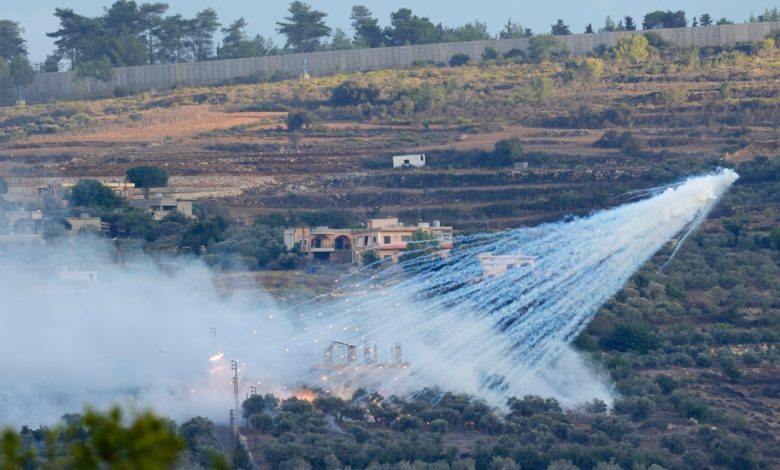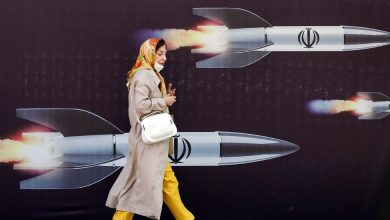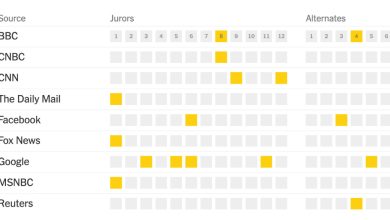Fearing Escalation, Biden Seeks to Deter Iran and Hezbollah

The Biden administration has grown increasingly anxious in recent days that Israel’s enemies may seek to widen the war with Hamas by opening new fronts, a move that could compel the United States to enter the conflict directly with air and naval forces to defend its closest ally in the region.
The administration has sought to use diplomatic and military avenues to head off any expansion. The Pentagon dispatched a second aircraft carrier to the region over the weekend along with additional land-based warplanes, even as Washington sent back-channel messages to Iran through intermediaries in Qatar, Oman and China warning against escalation.
Fears of a second front deepened on Sunday as intense clashes broke out along Israel’s northern border. Hezbollah, the Iranian-backed militia that controls southern Lebanon, fired missiles into Israel, and Israel responded with artillery fire and airstrikes. A full-fledged attack on the north could overwhelm Israel, as most of its forces are focused on a potential ground invasion of Gaza, in the south.
“We can’t rule out that Iran would choose to get directly engaged some way,” Jake Sullivan, President Biden’s national security adviser, said on CBS’s “Face the Nation” on Sunday. “We have to prepare for every possible contingency. That’s exactly what the president has done. That is part of what has motivated the president’s movement of these assets, to send that clear message of deterrence to make clear that this war should not escalate.”
Some experts warned that such a scenario remains frighteningly possible because Israel’s vulnerability was exposed by Hamas’s surprise attack that killed more than 1,300 people, including at least 29 Americans. Hezbollah poses a markedly more serious threat to Israel than Hamas because of its vast arsenal of precision-guided missiles and thousands of experienced and well-trained fighters. Iran and Hezbollah may decide this is a moment of maximum opportunity to take on a wounded Israel, which is focused on recovering 150 hostages and destroying Hamas as a viable organization in Gaza.
Martin S. Indyk, a former ambassador to Israel and Middle East special envoy, put the odds of a wider war at 50-50. “The potential for it to spread not only to Lebanon but beyond Lebanon is very high,” he said in an interview. “That’s why you see the administration so actively engaged in trying to fend them off, which they normally wouldn’t have to do if there hadn’t been such a big blow to Israel’s deterrence.”
An Iranian close to the government said that no decision had been made about whether to open a new front against Israel but added that a meeting was to be held on Sunday night in a Hezbollah command center in the Lebanese capital, Beirut, to deliberate.
After Hamas attacked Israel on Oct. 7, Iran’s proxy militias throughout the region were placed on high alert, as was Tehran’s own military, according to two people familiar with Iran’s military calculations.
Iran itself does not plan to attack Israel if it is not attacked, the people said, but the leaders of the so-called resistance axis supported by Tehran have been discussing whether Hezbollah should enter the war. The final decision, they added, may depend on what happens if Israel’s ground forces enter Gaza as expected.
Iran’s foreign minister, Hossein Amir Abdollahian, has been on a diplomatic tour around the region to Iraq, Lebanon, Syria and Qatar, countries aligned with or friendly to Iran, according to Iran’s state media. He openly displayed Iran’s support for Hamas by meeting with its political head, Ismail Haniyeh, in Doha, Qatar. He also met with Hezbollah’s leader, Hassan Nasrallah, in Beirut.
After Mr. Amir Abdollahian’s three-hour meeting with Mr. Haniyeh, a Hamas representative, Khalil al-Hayya, said the two had agreed to create “a wider front against Israel” and discussed how to prevent Israel’s anticipated assault on Gaza, according to IRNA, Iran’s state news agency.
“In my meetings with the heads of the resistance,” Mr. Amir Abdollahian said, “I learned that when the time comes to answer these crimes, it will determine and change the current map of the occupied territories.”
In his public statements over the past week, Mr. Biden has repeatedly made clear that he stands solidly with Israel and has sought to send a clear message to Iran through military deployments. He ordered the Gerald R. Ford, the Navy’s largest and most advanced aircraft carrier, to the eastern Mediterranean along with its escort group last week. Then on Saturday, Defense Secretary Lloyd J. Austin III ordered the Dwight D. Eisenhower carrier to join it.
The Air Force is similarly rushing more warplanes to the region, doubling the number of F-16, A-10 and F-15 squadrons on the ground. Combined with the four squadrons of F/A-18 jets aboard each of the two carriers, the United States will have an aerial armada of more than 100 attack planes, according to military officials.
The Pentagon has also sent a small team of Special Operations forces to Israel to assist with intelligence and planning to help locate and rescue the hostages held by Hamas, who are believed to include some Americans.
Israel has historically resisted foreign ground troops participating in operations on its territory, and White House officials have said they are not contemplating any action on the ground by American forces. But if Hezbollah opens a major assault, the United States could come to Israel’s aid by using naval and air units to bombard the militia in Lebanon.
“Moving the two carriers into the region sends a very strong signal,” Gen. Frank McKenzie, the retired commander of the U.S. Central Command, said on “Face the Nation.” “There is ample historical evidence that Iran respects the flow of combat forces into the theater. It does affect their decision calculus. And as Iran’s decision calculus is affected, so is Lebanese Hezbollah’s calculus affected.”
Still, an Iranian close to the government said the U.S. diplomatic messages sent through intermediaries indicated that the United States had no intention to get into a war with Iran and that the warships were meant for moral support of Israel. That may suggest a difference in interpretation. American officials said they do not want war with Iran but were explicitly sending the military forces to deter Tehran with the option of using them if provoked.
Analysts wondered if the message had truly gotten through. They said the fact that Mr. Biden felt compelled to send a second carrier group suggested that the deployment of the first one did not produce the kind of response from Iran that Washington had expected or wanted.
Other American political leaders sounded strong warnings against Tehran on Sunday. Senator Lindsey Graham, Republican of South Carolina, said that if Hezbollah launched a major attack on Israel, he would introduce legislation authorizing U.S. military action in conjunction with Israel “to knock Iran out of the oil business.” Speaking on NBC’s “Meet the Press,” Mr. Graham said: “Iran, if you escalate this war, we’re coming for you.”
Representative Michael McCaul, Republican of Texas and the chairman of the House Foreign Affairs Committee, said the prospect of escalation by Hezbollah was real and that direct involvement by Iran would be even more frightening. “This is the nightmare scenario we have always been worried about,” he said on Fox News, adding, “That’s what worries me the most.”
The prospect of renewed military action in the Middle East comes after years in which the United States has sought to disentangle itself from what came to be called “the forever wars” in Iraq, Syria and Afghanistan. At the moment, the United States is occupied helping Ukraine beat back invaders from Russia, though not with American troops. That mission has taxed American weapons stores and generated increasing opposition on the hard right.
With Mr. Biden’s request for $24 billion in additional aid to Ukraine stalled by House Republicans, the White House and congressional leaders are discussing a broader security package that would combine money for Ukraine with aid for Israel. It would also include additional assistance for Taiwan and funds for enhanced protection of America’s southwestern border.
While all this could strain American resources, Mr. Biden said the United States could afford to help both Israel and Ukraine. “We can take care of both of these and still maintain our overall international defense,” he said in an interview aired on CBS’s “60 Minutes” on Sunday evening. “We have the capacity to do this and we have an obligation to.”
As for his message to Iran and Hezbollah, Mr. Biden said it was simple: “Don’t, don’t, don’t, don’t.”
So far, the fighting on Israel’s northern border has been limited but alarming. Israeli emergency services said that at least one Israeli civilian was killed and three others wounded in Sunday’s attack on the border community of Shtula. Hezbollah said two of its fighters were killed by Israel’s counterattack.
In a statement, Hezbollah said its missile strike was in response to the death of a Reuters cameraman, Issam Abdallah, along with two other civilians killed in recent clashes in southern Lebanon. The United Nations said its peacekeeping headquarters in Naqoura, Lebanon, was hit by a rocket, but it was not clear whose. The peacekeepers were not in shelters at the time and no one was hurt, officials said.
After the exchange of fire, the Israeli military said it had designated a 2.5-mile area near the Lebanon border as an “isolation zone.” No one would be allowed into the zone, and any civilians already there must stay close to safe rooms in their homes, the military said.
“People are preparing for the worst,” said Shimon Guetta, the chair of the regional council of Ma’ale Yosef, which oversees Shtula. “After what happened in the south, the residents are terrified that could repeat itself here.”
Reporting was contributed by Edward Wong, Eric Schmitt, Euan Ward and Aaron Boxerman.




